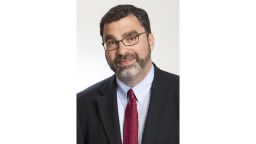Editor’s Note: Mark Hetfield is the president and CEO of HIAS, the global Jewish nonprofit that protects refugees. The views expressed here are his. Read more opinion on CNN.
One year ago, on October 27, 11 people were murdered while praying in the Pittsburgh Tree of Life synagogue. It was the deadliest attack on the Jewish community in the history of the United States. In the hours before the shooting, the attacker posted to social media that he couldn’t “sit by” while HIAS, the Jewish nonprofit that protects refugees, which I lead, “likes to bring invaders in that kill our people.” Some people believe that Tree of Life may have been targeted because Dor Hadash, one of the three congregations that was housed in the building, was among the nearly 300 that joined HIAS’ National Refugee Shabbat celebration just days earlier.

How did such violence come to my old neighborhood — literally Mister Rogers’ neighborhood? Looking back at the mass murder in Pittsburgh and seeing all the other attacks on religious and ethnic minorities over the last 12 months, I’m reminded that anti-Semitism never appears in a vacuum. It is but one tentacle of hatred that is inextricably linked to other forms of hatred against other “others.” To fight anti-Semitism, we must fight against all forms of hate. Or we will fail.
Looking back at the last year is hard because our view is so obstructed by terrorist attacks against communities of faith: Christchurch, New Zealand, where 51 Muslims were shot and killed while praying on March 15; Sri Lanka, where nearly 300 Christians were killed in a series of bombings while praying on Easter Sunday; Poway, California, in April, where a Jewish woman was killed while praying on the last day of Passover; El Paso, Texas, where someone wanting to “kill as many Mexicans as possible” murdered 22 people on August 3; and Halle, Germany, where two people were killed outside of a synagogue on Yom Kippur, the holiest day of the Jewish year.
The look back is obscured by the fact that, over the last year, neither the Trump administration nor Congress has gone far enough to prevent another Pittsburgh from happening in the United States. And, in fact, such mass murders keep on happening.
The look back is obscured by the fact that the President of the United States has never acknowledged that the tragedy in Pittsburgh was an attack against Jews for standing with refugees. In fact, last month President Trump gave the murderer what he wanted, by announcing that he is slashing the number of refugees lawfully admitted to the United States to 18,000 — the lowest number in the nearly 40-year history of the US Refugee Admissions Program.
The look back is obscured by the President’s continued use of similar language used by the terrorist in Pittsburgh, invoking variants of the word “invaders” to describe asylum seekers and refugees multiple times since the Pittsburgh attack and hundreds more in rallies and speeches, including one before the Republican Jewish Coalition on April 6, 2019. Just last month, before the United Nations General Assembly, the President similarly and untruthfully vilified “non-governmental organizations” like HIAS as a “growing cottage industry” with “cruel and evil policies” that “encourage illegal migration and demand erasure of national borders.” By making such an inflammatory statement, the President has put the safety of HIAS, our partners and other agencies that work with refugees at risk.
And in fighting anti-Semitism and hatred, leadership matters. Yet, at the national level, our leaders fail us. As the President continues to stoke the fires of hate and fear that have burned in our society for hundreds of years, other so-called leaders simply stand by in complicit silence.
The heroes of Pittsburgh were not our national leaders but, as Mister Rogers would say, “the people in our neighborhood.” Our communities, our first responders, our neighbors.
My visits to Pittsburgh after the horrific attack restored my faith in the city, in our country, in humanity. Every Pittsburgher — from taxi drivers to the Pittsburgh Steelers — went out of their way to demonstrate their solidarity with the Jewish community, including HIAS’ refugee resettlement partner Jewish Family and Community Services, to console the survivors, to donate to the rebuilding of the Tree of Life. The Post-Gazette published the Jewish mourning prayer – the Kaddish – in Hebrew as the headline on its front page. Mister Rogers’ neighborhood lived up to the values he taught my generation and my children’s generation.
The Torah tells us that the duty to welcome and to care for the most vulnerable among us—including the stranger—falls not on the king, the pharaoh or the ruler, but on each one of us. This is what the people of Pittsburgh reminded us with their actions over the last 12 months.
We can’t count on our national leaders to welcome the stranger and protect each of us, so we must rise to the occasion ourselves. We will come together again for National Refugee Shabbat in 2020. We will follow the example of our Pittsburgh neighbors.

